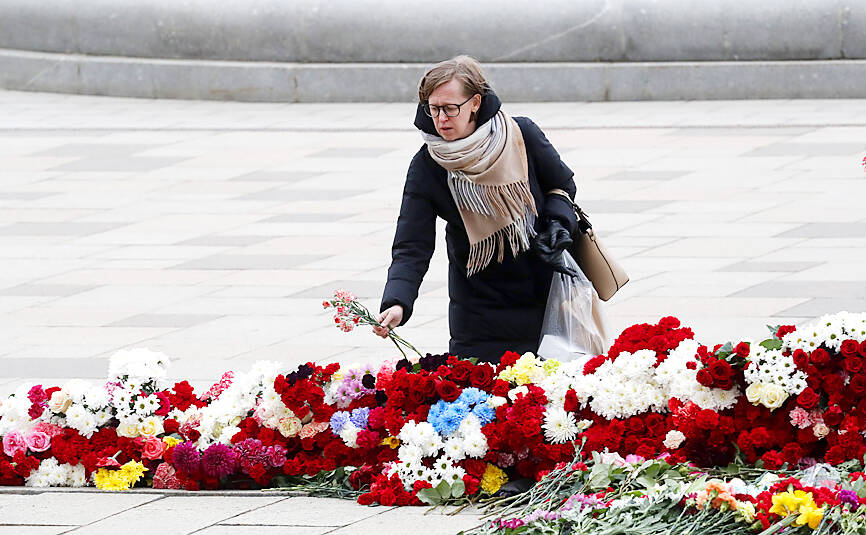Russian President Vladimir Putin on Monday said for the first time that “radical Islamists” were behind last week’s attack on a concert hall outside Moscow, but suggested they were linked to Ukraine somehow.
Eleven people have been detained in connection with the attack, which saw camouflaged gunmen storm into Crocus City Hall, open fire on concertgoers and set the building ablaze, killing at least 139 people.
“We know that the crime was committed by the hands of radical Islamists, whose ideology the Islamic world itself has been fighting for centuries,” Putin said in a televised meeting.

Photo: EPA-EFE
However, the Russian leader said that “many questions” remained unanswered, including why the attackers tried to flee to Ukraine — a claim that Kyiv has rejected.
“Of course, it is necessary to answer the question, why, after committing the crime, the terrorists tried to go to Ukraine. Who was waiting for them there?” Putin asked.
“This atrocity might be just a link in a whole series of attempts by those who have been at war with our country since 2014,” he said, referring to Ukraine and its allies.
Ukraine has described accusations it was involved as absurd.
“Putin was talking to himself again, and it was again broadcast on television. Again, he blames Ukraine,” Ukrainian President Volodymyr Zelenskiy said in his evening address.
The Islamic State group has said several times since Friday last week that it was responsible and Islamic State-affiliated media channels have published graphic videos of the gunmen inside the venue.
When asked about Islamic State’s claimed involvement, Kremlin spokesman Dmitry Peskov on Monday said that an investigation was still ongoing.
Officials expect the death toll to rise further, as rescuers were searching the site for remains on Monday and 97 people were still in hospital.
The Kremlin has expressed confidence in the nation’s security agencies, despite swirling questions over how they failed to thwart the massacre amid public and private warnings by the US’ intelligence apparatus.
In a series of late-night hearings in Moscow that ran into the early hours of Monday, four of the suspects — with bruises and cuts on their swollen faces — were dragged in to the capital’s Basmanny District Court before dozens of reporters.
FSB officers wheeled one into the hearing on a gurney, his eyes barely open.
Peskov refused to comment on reports and videos on social media that showed bloody interrogations of the suspects after they were arrested on Saturday.
The court identified them as Muhammadsobir Fayzov, Shamsidin Fariduni, Rachabalizoda Saidakrami and Dalerjon Mirzoyev. Russian state media said they were all citizens of Tajikistan.
Two of them pleaded guilty, the court said.
Three other suspects, whom Russian media identified as family members Aminchon Islomov, Dilovar Islomov and Isroil Islomov, were remanded in pretrial detention on Monday.
One of those detained has Russian citizenship, Interfax news agency reported.
All of those held in custody have been charged with terrorism and face up to life in prison.
The Kremlin has pushed back at suggestions that the death penalty would be reintroduced.

Kehinde Sanni spends his days smoothing out dents and repainting scratched bumpers in a modest autobody shop in Lagos. He has never left Nigeria, yet he speaks glowingly of Burkina Faso military leader Ibrahim Traore. “Nigeria needs someone like Ibrahim Traore of Burkina Faso. He is doing well for his country,” Sanni said. His admiration is shaped by a steady stream of viral videos, memes and social media posts — many misleading or outright false — portraying Traore as a fearless reformer who defied Western powers and reclaimed his country’s dignity. The Burkinabe strongman swept into power following a coup in September 2022

‘FRAGMENTING’: British politics have for a long time been dominated by the Labor Party and the Tories, but polls suggest that Reform now poses a significant challenge Hard-right upstarts Reform UK snatched a parliamentary seat from British Prime Minister Keir Starmer’s Labor Party yesterday in local elections that dealt a blow to the UK’s two establishment parties. Reform, led by anti-immigrant firebrand Nigel Farage, won the by-election in Runcorn and Helsby in northwest England by just six votes, as it picked up gains in other localities, including one mayoralty. The group’s strong showing continues momentum it built up at last year’s general election and appears to confirm a trend that the UK is entering an era of multi-party politics. “For the movement, for the party it’s a very, very big

ENTERTAINMENT: Rio officials have a history of organizing massive concerts on Copacabana Beach, with Madonna’s show drawing about 1.6 million fans last year Lady Gaga on Saturday night gave a free concert in front of 2 million fans who poured onto Copacabana Beach in Rio de Janeiro for the biggest show of her career. “Tonight, we’re making history... Thank you for making history with me,” Lady Gaga told a screaming crowd. The Mother Monster, as she is known, started the show at about 10:10pm local time with her 2011 song Bloody Mary. Cries of joy rose from the tightly packed fans who sang and danced shoulder-to-shoulder on the vast stretch of sand. Concert organizers said 2.1 million people attended the show. Lady Gaga

SUPPORT: The Australian prime minister promised to back Kyiv against Russia’s invasion, saying: ‘That’s my government’s position. It was yesterday. It still is’ Left-leaning Australian Prime Minister Anthony Albanese yesterday basked in his landslide election win, promising a “disciplined, orderly” government to confront cost-of-living pain and tariff turmoil. People clapped as the 62-year-old and his fiancee, Jodie Haydon, who visited his old inner Sydney haunt, Cafe Italia, surrounded by a crowd of jostling photographers and journalists. Albanese’s Labor Party is on course to win at least 83 seats in the 150-member parliament, partial results showed. Opposition leader Peter Dutton’s conservative Liberal-National coalition had just 38 seats, and other parties 12. Another 17 seats were still in doubt. “We will be a disciplined, orderly